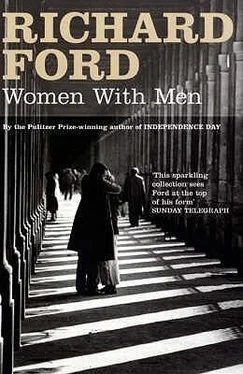Richard Ford - Women with Men
Здесь есть возможность читать онлайн «Richard Ford - Women with Men» весь текст электронной книги совершенно бесплатно (целиком полную версию без сокращений). В некоторых случаях можно слушать аудио, скачать через торрент в формате fb2 и присутствует краткое содержание. Год выпуска: 2006, Издательство: Bloomsbury Publishing PLC, Жанр: Современная проза, на английском языке. Описание произведения, (предисловие) а так же отзывы посетителей доступны на портале библиотеки ЛибКат.
- Название:Women with Men
- Автор:
- Издательство:Bloomsbury Publishing PLC
- Жанр:
- Год:2006
- ISBN:нет данных
- Рейтинг книги:3 / 5. Голосов: 1
-
Избранное:Добавить в избранное
- Отзывы:
-
Ваша оценка:
- 60
- 1
- 2
- 3
- 4
- 5
Women with Men: краткое содержание, описание и аннотация
Предлагаем к чтению аннотацию, описание, краткое содержание или предисловие (зависит от того, что написал сам автор книги «Women with Men»). Если вы не нашли необходимую информацию о книге — напишите в комментариях, мы постараемся отыскать её.
Women with Men — читать онлайн бесплатно полную книгу (весь текст) целиком
Ниже представлен текст книги, разбитый по страницам. Система сохранения места последней прочитанной страницы, позволяет с удобством читать онлайн бесплатно книгу «Women with Men», без необходимости каждый раз заново искать на чём Вы остановились. Поставьте закладку, и сможете в любой момент перейти на страницу, на которой закончили чтение.
Интервал:
Закладка:
The other envelope was marked: Mr. Matthews. In it was a similar piece of folded notepaper, on which he read these things:
My last thoughts…
I'm hurrying. I don't want you to come back and find me. Alive! Death is my little secret. I would like to stay in France. Please try for that. I really just don't fit anymore. Among the living, I mean. It's really no more complicated than that. (This stuff already seems to be working!)
I think a good life is supposed to be to die knowing nothing. Or maybe it's to die knowing nobody. Anyway, I've almost succeeded at both of them.
“Only in paradise is death banned from claiming the weak.” This is a saying I've been saving. I forget where I heard it. Maybe TV. This stuff is working.
We were never in love. Don't misunderstand that. It will make all this trouble much easier. A cancer cell is just one organism proliferated. I thought of it being like a novel representing all of life and we had that in common. But it's not. It's not a metaphor.
Don't open the other envelope. Please! Goodbye. Good luck.
Affectionately,
Helen
HE COULD SEE both towers now: the Montparnasse and the Eiffel, though they were cut off by lowering clouds. Only their bottom halves were visible. He had thought, of course, that they would both make it home. And yet this had taken so little, so little time, only a small amount of planning. He didn't see how he could've been gone long enough. He'd said he loved her the night before and meant it, and she had said no to that. But if they weren't in love, he thought, what were they? And what was the spiritual component she'd wanted, the thing that to his discredit he couldn't think of? He had let her down.
He wondered if Helen had been reading his book. There was no sign to indicate that, on the bed table or on the floor. On the bed, anywhere. Probably that was all meant as a joke. Someone was jogging around the cemetery wall, clockwise. A woman in a bright-yellow running outfit. He didn't believe she could be French. The French were different: their gait; their pace; the distance they kept and didn't keep. A Frenchwoman would never run around a cemetery in a bright-yellow outfit.
Clouds were causing darkness to arrive early. The dog had stopped barking. A clock was chiming. The Christmas tree in the high window across rue Froidevaux shone coldly in the late day. Again he heard the shuffling card sounds through the wall.
“YOUR WIFE. I'm very sorry,” the manager said. They were waiting. The people who were coming had decided to take their time.
“She wasn't my wife,” Matthews said. “But — but I knew her very well.” He had stammered. It shocked him. This was the first time in years. He had stammered as a child, experienced other difficulties, hadn't learned things very fast, but had overcome it.
“Of course,” the Indian man said, and made the little gasping sound, the quick intake of breath, which signified, in this instance, he guessed, sympathy.
That was what marriage meant, Matthews thought: what you did at the very end. What you thought, how you felt, what you said. Your responsibilities were different then. He realized suddenly that he had forgotten to buy flowers. He had said to himself that he would and then hadn't. It was another error, and the thought of it made his heart suddenly race.
Outside in the afternoon air, swifts skittered among the rooftops and chimneys and out into the space above the cemetery. He was very hungry. He hadn't eaten since last night. Later on, he thought, he would have to find a place, someplace nearby, take his chances with the French, eat his dinner alone.
HIS ONLY OTHER trip to Europe had been to Spain. To Madrid, he said. He had been fifteen. Nineteen seventy-four. A youth group. They had stayed near the Parque del Buen Retiro and the Prado and walked and walked and walked, was what he remembered. For some of it he was sick, of course. But on the last day he was forced by others to attend the bullfight. Against his will entirely. They had ridden the subway to the stadium and sat in the sun in front of a legion of old Spaniards who were drunk on wine. All men. Sandwiches were passed around. In all, six bulls were killed, though none of them cleanly. Most, he remembered, didn't seem to want to fight at all. Often they just stood, observing what was happening to them. He'd hated it, he told her, had tried to leave. But everyone — his school friends — insisted he stay. He would never see it again. People threw cushions, eventually.
“Yes,” Madame de Grenelle said. She had lived in the south, she said. A city called Perpignan. She had been taken herself.
Outside, children were chasing pigeons with switches in a little park. They were near Parc Montsouris. She shared a house with another woman, a pale stone row house built in the twenties, with creaking, shiny parquet floors and tall windows at both ends of the long downstairs study. At either end there seemed to be a park. On the walls were photographs, black-and-whites, showing what he thought were African women seated on the ground, weaving baskets in a dirty village, or washing clothes in a thick river, or holding babies to their breasts. All stared languidly at the camera. He had brought flowers, purple anemones.
Madame de Grenelle was of mixed race. That's all he could tell. She was tall and willowy, with dyed black hair, a flat nose, large hands and pale-blue eyes. Possibly, he thought, she was Berber — because of her eyes, and because she wore a long, thick caftan that was maroon with blue and purple octagon designs. It seemed to him Moroccan. Her father had been a professor of English in Toulouse.
“Translators have no lives of our own,” she said in amusement. “We live off others’ lives. Sometimes nicely.” She smiled. They were seated in chairs in the middle of the long room, where the least light reached from outside. She was fifty, he thought. She smoked American cigarettes. Chesterfields. She'd put his flowers in a vase on a table beside them. He didn't know how to answer her. “Your book has the ring of actuality about it,” she went on. “It's fascinating.”
He didn't know if she meant it was true or simply seemed true. He chose the latter and simply said, “Good.”
“It is your story, I think. The predicament.”
“No,” Matthews lied.
“No?” she said, and smiled at him in a penetrating way.
“I wanted it to seem true,” he said.
“I see,” she said. His book lay on the table beside his flowers. “‘Predicament’ does not exist in French.” She smoked her cigarette. “Often, of course, you learn what your book is about after you write it. Sometimes after someone translates it and tells you.”
“It could be,” Matthews said. “I can believe that.”
“Your book will be better in French, I think,” she said. “It's humorous. It needs to be humorous. In English it's not so much. Don't you think so?”
“I didn't think it was humorous,” he said, and thought about the street names he'd made up. The Paris parts.
“Well. An artist's mind senses a logic where none exists. Yet often it's left incomplete. It's difficult. Only great geniuses can finish what they invent. In French, we say…” And she said something then that Matthews didn't understand but didn't try. “Do you speak French?” She smiled politely.
“Just enough to misunderstand everything,” he said, and tried to smile back.
“It doesn't matter,” Madame de Grenelle said, and paused. “So. It is not quite finished in English. Because you cannot rely on the speaker. The I who was jilted. All the way throughout, one is never certain if he can be taken seriously at all. It is not entirely understandable in that way. Don't you agree? Perhaps you don't. But perhaps he has murdered his wife, or this is all a long dream or a fantasy, a ruse — or there is another explanation. It is meant to be mocking.”
Читать дальшеИнтервал:
Закладка:
Похожие книги на «Women with Men»
Представляем Вашему вниманию похожие книги на «Women with Men» списком для выбора. Мы отобрали схожую по названию и смыслу литературу в надежде предоставить читателям больше вариантов отыскать новые, интересные, ещё непрочитанные произведения.
Обсуждение, отзывы о книге «Women with Men» и просто собственные мнения читателей. Оставьте ваши комментарии, напишите, что Вы думаете о произведении, его смысле или главных героях. Укажите что конкретно понравилось, а что нет, и почему Вы так считаете.












